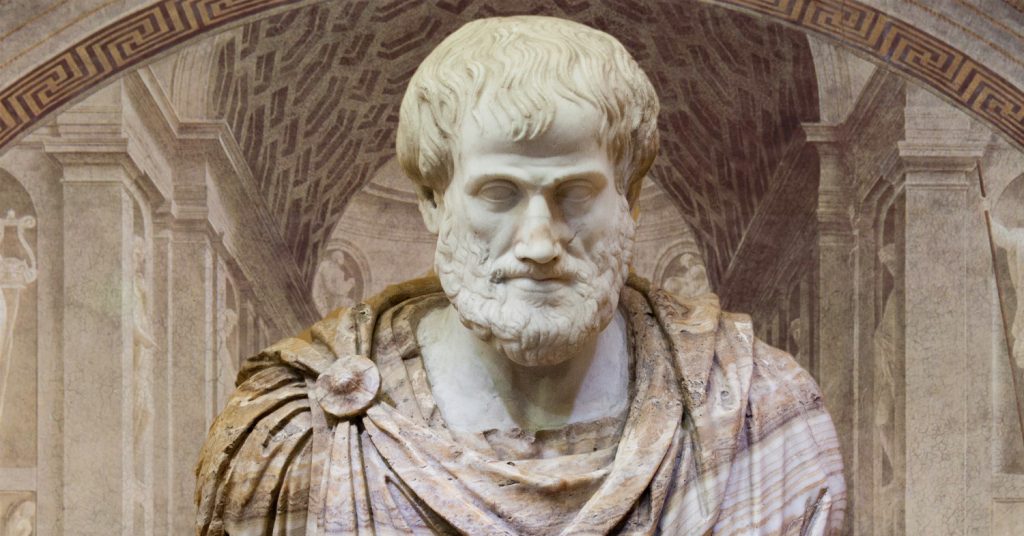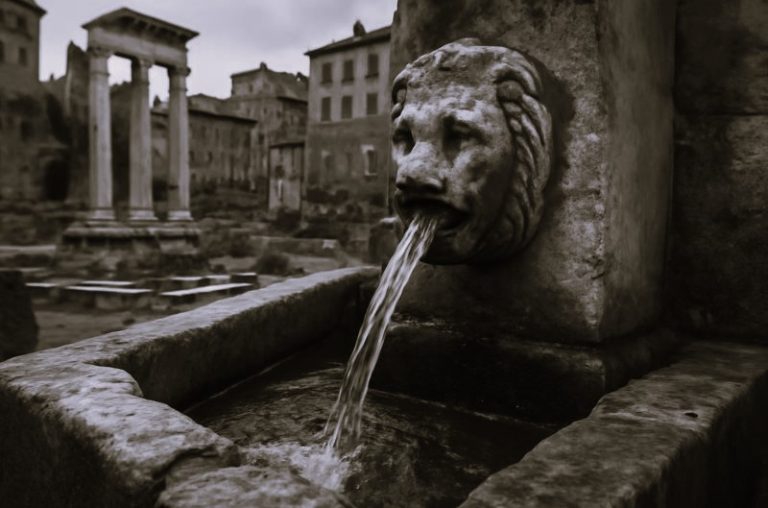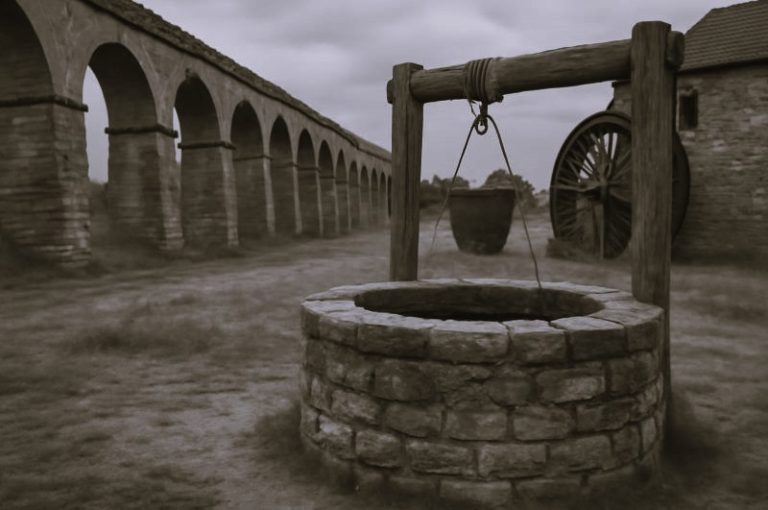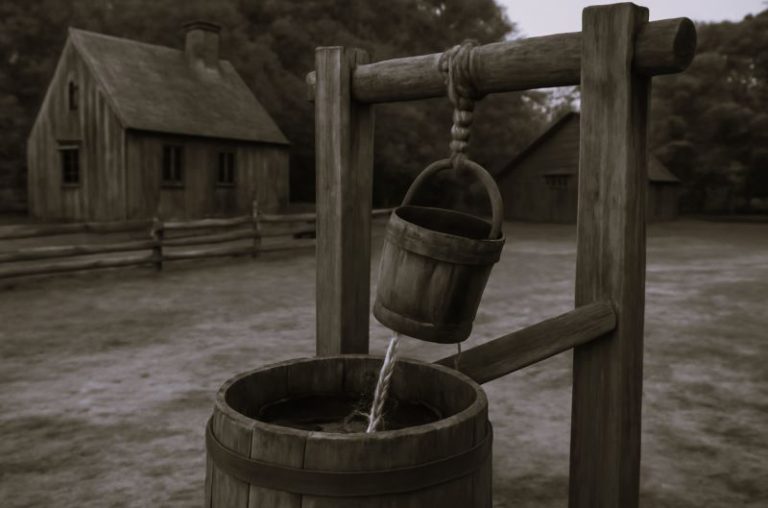
The Greek philosopher Aristotle believed that questions of the state, how it should be organized, and how it should pursue its ends, were fundamental to the achievement of happiness. His text Politics is an exploration of different types of state organizations and tries to describe the state which will ultimately lead to the most fulfilled citizens.
Forms of Government
Aristotle argued that there were six general ways in which societies could be organized under political rule, depending on who ruled, and for whom they ruled.

Those in the first row he referred to as “true forms” of government, while those in the second row were the “defective and perverted forms” of the first three.
The true forms of government, therefore, are those in which the one, or the few, or the many, govern with a view to the common interest; but governments which rule with a view to the private interest, whether to the one, or the few, or of the many, are perversions.
[…]
Tyranny is a kind of monarchy which has in view the interest of the monarch only; oligarchy has in view the interest of the wealthy; democracy, of the needy: none of them the common good of all.
It is important to note that in Aristotle’s time, states were comparatively smaller than they are today. Thus, in democracies, the many could directly rule via participation in open councils.
Although our democracies are much larger now, the core concepts remain the same: Our vote is our means of exercising our rule, and any one of us may chose to run for an office of the state.
Aristotle argued that oligarchies and democracies are the most common forms of government, with much in common except their allocation of power; and thus he spends a lot of time discussing them.
For the real difference between democracy and oligarchy is poverty and wealth. Wherever men rule by reason of their wealth, whether they be few or many, that is an oligarchy, and where the poor rule, that is a democracy.
It is important to note that Aristotle did not consider oligarchies and democracies as inherently bad. Even though they govern in the interest of those who hold the power, they are capable of producing livable societies, unlike tyranny, which no free man in his right mind would choose.
But he also aims to demonstrate that there are better ways to govern. These better systems, however, are reliant on a quality of character in leadership that is uncommon.
Therefore, for him there was no clear cut best system: “None of the principles on which men claim to rule, and hold other men in subjection to them, are strictly right.”
Democracy vs. Polity
For Aristotle, democracies [as he defined them] were very polarized societies, containing rich and poor and not much in between. For democracy, “equality is above all things their aim, and therefore they ostracize and banish from the city for a time those who seem to predominate too much through their wealth, or the number of their friends, or through any other political influence.”
Part of the reason Aristotle liked democratic systems is that he believed in the wisdom of crowds. (A remarkably modern idea.) “If the people are not utterly degraded, although individually they may be worse judges than those who have special knowledge, as a body they are as good or better.”
This is useful, because all societies must evolve their governing rules as needs change. No society can unflinchingly abide by a set constitution of rules in perpetuity; rigidity is not a valuable quality in a changing world. (Even the American constitution was designed to be amended.)
“Laws speak only in general terms, and cannot provide for circumstance. … Hence it is argued that a government acting according to written laws is plainly not the best.” The leadership must be able to follow the laws while adjusting for circumstance. In this “the many are more incorruptible than the few“; and thus might be the most flexible to change.
Aristotle also cautioned against something he called extreme democracy – as it can lead to demagogues.
…in which, not the law, but the multitude, have the supreme power, and supersede the law by their decrees. … The demagogues make the decrees of the people override the laws, and refer all things to the popular assembly. And therefore they grow great, because the people have all things in their hands, and they hold in their hands the votes of the people, who are too ready to listen to them.
Eventually this ceases to be a democracy at all, because “the sort of constitution in which all things are regulated by decrees is clearly not a democracy in the true sense of the word, for decrees relate only to particulars.”
The right kind of democracy, if you will, is a polity: An ideal democracy that governs for the interests of all, not just the leadership.
The success of a polity is dependent on the quality of the leadership and their definition of the common interest, leading to an interesting question: What is the common interest, anyway?
Trying to define it is very difficult. Here, we cannot take many lessons from Aristotle, because the “common interest” is a concept that’s changed much over time. We now have a more inclusive notion of who belongs in the “common interest” than the ancient Greeks did.
Nonetheless, the general principles – quality of laws, virtue, and the middle class – are worth considering.
Critically, “There are two parts of good government; one is the actual obedience of citizens to the laws, the other part is the goodness of the laws which they obey.” We must pay close attention to the content of the laws we’re following: They must constantly be reevaluated to make sure they remain consistent with the common interest.
Aristotle also foreshadowed modern ideals by linking the middle class to virtue itself: A great democratic system should govern in their interests, cultivating a happy medium.
This is one of the key characteristics of the polity.
The happy life is the life according to unimpeded virtue, and that virtue is a mean (average), then the life which is in a mean, and in a mean attainable by every one, must be the best.
[…]
Thus it is manifest that the best political community is formed by citizens of the middle class, and that those states are likely to be well-administered, in which the middle class is large, and larger if possible than both the other classes (rich and poor).
[…]
Great then is the good fortune of a state in which the citizens have a moderate and sufficient property; for where some possess much, and the other nothing, there may arise an extreme democracy, or a pure oligarchy; or a tyranny may grow out of either extreme … but it is not so likely to arise out of a middle and nearly equal condition.
Larger middle classes produce more stable states. Thus, the middle class is key in the establishment and maintenance of a polity. Because they are not in extreme need nor extreme wealth, their assessment of the common interest will produce the greatest benefit for all members.
Concluding: Why Government At All?
For Aristotle, the organization of people into states with governments was a key component of their achieving happiness and satisfaction in life.
It is clear then that a state is not a mere society, having a common place, established for the prevention of crime and for the sake of exchange. These are all conditions without which a state cannot exist; but all of them together do not constitute a state, which is a community of well-being in families and aggregations of families, for the sake of a perfect and self-sufficing life.
The best way to organize the state is the one that creates the most happiness for its citizens (not an easy problem, of course). For Aristotle, the polity, the ideal democracy, met this criteria — it allowed for the development of virtues that support the common interest, and limited the emphasis on wealth, allowing for the development of a desirable middle class.
Happiness, whether consisting in pleasure or virtue, or both, is more often found with those who are most highly cultivated in their mind and in their character, and have only a moderate share of external goods, than among those who possess external goods to a useless extent but are deficient in higher qualities.
Originally published by Farnam Street, February 2017, republished under fair use for educational, non-commercial purposes.







